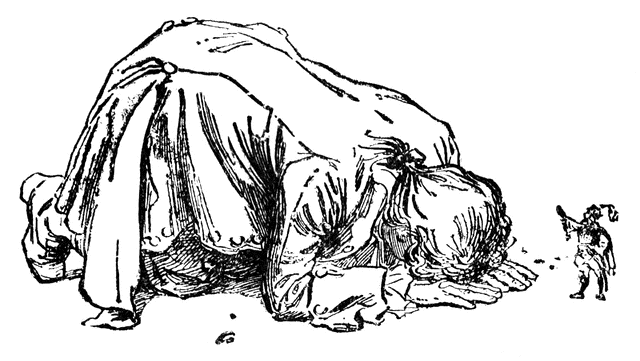
Tuesday
So now Donald Trump, after ramping up war talk with Iran, is magnanimously claiming to be a moderate by calling off his airstrike. Killing 150 Iranians, he tells us, would be a disproportionate response to the downing of an American drone.
This time he’s right. Less excusable is that he got us into the situation in the first place by blowing up the nuclear weapons agreement. Many have compared him to an arsonist who wants credit for dousing the fire.
The details surrounding the canceled airstrike are murky, but it’s clear that the president revels in being seen as someone who can mete of life and death. In this way he reminds me of another head of state who talks big but is small in every other way.
I’ll describe the Lilliputian equivalent of Trump’s Iranian reversal in a moment. Let’s first note that, like Trump, the Lilliputian emperor is a master of self-promotion. Here’s how the four-inch man has himself described:
Golbasto Momarem Evlame Gurdilo Shefin Mully Ully Gue, most mighty Emperor of Lilliput, delight and terror of the universe, whose dominions extend five thousand blustrugs (about twelve miles in circumference) to the extremities of the globe; monarch of all monarchs, taller than the sons of men; whose feet press down to the centre, and whose head strikes against the sun; at whose nod the princes of the earth shake their knees; pleasant as the spring, comfortable as the summer, fruitful as autumn, dreadful as winter…
The emperor also resembles Trump in how he treats those who have served him well in the past. Gulliver at first gains great applause by single-handedly eliminating the navy of Lilliput’s deadly enemy Blefescu. He is labeled a traitor, however, after he refuses to destroy the county altogether. When (to borrow language from Trump’s weekend tweet to Iranian president Hassan Rouhani), the emperor wants to rain down “CONSEQUENCES THE LIKES OF WHICH FEW THROUGHOUT HISTORY HAVE EVER SUFFERED BEFORE,” Gulliver balks:
[S]o unmeasureable is the ambition of princes, that he seemed to think of nothing less than reducing the whole empire of Blefuscu into a province, and governing it, by a viceroy; of destroying the Big-endian exiles, and compelling that people to break the smaller end of their eggs, by which he would remain the sole monarch of the whole world. But I endeavored to divert him from this design, by many arguments drawn from the topics of policy as well as justice; and I plainly protested, “that I would never be an instrument of bringing a free and brave people into slavery.” And, when the matter was debated in council, the wisest part of the ministry were of my opinion.
This open bold declaration of mine was so opposite to the schemes and politics of his imperial majesty, that he could never forgive me.
The price for treason is death, but here’s where the Lilliputian emperor pulls his Iranian reversal. Boasting of “his great lenity and tenderness, as qualities known and confessed by all the world,” he “mercifully” modifies his sentence: Gulliver will only have his eyes shot out. As with Trump, the bar for decency gets lowered.
Gulliver observes,
[N]or did anything terrify the people so much as those encomiums on his majesty’s mercy; because it was observed, that the more these praises were enlarged and insisted on, the more inhuman was the punishment, and the sufferer more innocent.
Gulliver’s Travels doesn’t only satirize narcissistic leaders, however. It also warns the public not to be taken in by big talk and self-promotion. Gulliver naively assumes the emperor follows ethical norms and is perpetually surprised when he doesn’t. His inability to call out inappropriate behavior is like those media outlets whose attempts at even-handedness are mocked by a man who plays them for suckers. Note how he beats around the bush rather than calling out the emperor’s attack for what it is:
Yet, as to myself, I must confess, having never been designed for a courtier, either by my birth or education, I was so ill a judge of things, that I could not discover the lenity and favour of this sentence, but conceived it (perhaps erroneously) rather to be rigorous than gentle.
Time and again Gulliver gives the Lilliputians the benefit of the doubt, only to get it wrong every time. He would do well to heed Masha Gessen’s advice on dealing with autocrats in her must-read New York Review of Books article. Drawing on her personal experiences with Vladimir Putin, she says that what you see in an autocrat is what you get, even though “our innate tendency is to reach for a rationalization.”
Too many media outlets are like Gulliver, behaving as if the old rules still apply and then acting perpetually surprised each time the president breaks another one. In some ways, it’s easier to be gullible because then you don’t have to push back. It’s like hiding out in innocence.
As Gulliver learns, however, deluding yourself doesn’t save you from the autocrat, who will accept nothing less than blind obedience. And who will shoot out your eyes to make sure he gets it.

